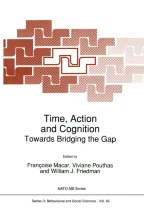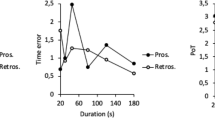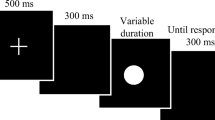Prospective and Retrospective Duration Judgment: The Role of Information Processing and Memory

Research comparing prospective and retrospective duration-judgment paradigms has produced diverse findings and conclusions. Two experiments reported here reveal that information-processing tasks influence duration judgment differently in the two paradigms. Experiment 1 shows that performing a more difficult task shortens prospective judgments but does not influence retrospective judgments. Experiment 2 shows that performing different kinds, rather than a single kind, of processing during a duration lengthens retrospective judgments but does not influence prospective judgments. Memory for nontemporal (stimulus) information processed during a time period cannot account for either prospective or retrospective duration judgment, because the pattern of effects and interactions is different. This finding rejects memory-storage models of duration judgment. Interactions of task and paradigm support a contextual-change model, which says that different kinds of contextual information subserve prospective and retrospective duration judgments.
This is a preview of subscription content, log in via an institution to check access.
Access this chapter
Subscribe and save
Springer+ Basic
€32.70 /Month
- Get 10 units per month
- Download Article/Chapter or eBook
- 1 Unit = 1 Article or 1 Chapter
- Cancel anytime
Buy Now
Price includes VAT (France)
eBook EUR 245.03 Price includes VAT (France)
Softcover Book EUR 316.49 Price includes VAT (France)
Hardcover Book EUR 316.49 Price includes VAT (France)
Tax calculation will be finalised at checkout
Purchases are for personal use only
Preview
Similar content being viewed by others

The Perception of Duration and the Judgment of the Passage of Time
Chapter © 2019

Judgment of duration and passage of time in prospective and retrospective conditions and its predictors for short and long durations
Article Open access 23 December 2022

Decisional carryover effects in interval timing: Evidence of a generalized response bias
Article 02 January 2020
References
- Arlin, M. (1986) The effects of quantity and depth of processing on children’s time perception’, Journal of Experimental Child Psychology 42, 84–96. ArticlePubMedGoogle Scholar
- Bakan, P. (1955) `Effect of set and work speed on time estimation’, Perceptual and Motor Skills 5, 147–148. Google Scholar
- Block, R. A. (1979) `Time and consciousness’, in G. Underwood and R. Stevens (eds.), Aspects of Consciousness: Vol. 1. Psychological Issues, Academic Press, London, pp. 179–217. Google Scholar
- Block, R. A. (1982) `Temporal judgments and contextual change’, Journal of Experimental Psychology: Learning Memory, and Cognition 8, 530–544. Google Scholar
- Block, R. A. (1990) `Models of psychological time’, in R. A. Block (ed.), Cognitive Models of Psychological Time, Lawrence Erlbaum Associates, Hillsdale, NJ, pp. 1–35. Google Scholar
- Block, R. A., George, E. J., and Reed, M. A. (1980) `A watched pot sometimes boils: A study of duration experience’, Acta Psychologica 46, 81–94. ArticlePubMedGoogle Scholar
- Block, R. A., and Reed, M. A. (1978) `Remembered duration: Evidence for a contextual-change hypothesis’, Journal of Experimental Psychology: Human Learning and Memory 4, 656–665. ArticleGoogle Scholar
- Brown, S. W. (1985) `Time perception and attention: The effects of prospective versus retrospective paradigms and task demands on perceived duration’, Perception and Psychophysics 38, 115–124. ArticlePubMedGoogle Scholar
- Brown, S. W., and Stubbs, D. A. (1988) `The psychophysics of retrospective and prospective duration timing’, Perception 17, 297–310. ArticlePubMedGoogle Scholar
- Brown, S. W., and West, A. N. (1990) `Multiple timing and the allocation of attention’, Acta Psychologica 75, 103–121. ArticlePubMedGoogle Scholar
- Craik, F. I. M., and Tulving, E. (1975) `Depth of processing and the retention of words in episodic memory’, Journal of Experimental Psychology: General 104, 268–294. ArticleGoogle Scholar
- Dobson, W. R. (1954) ‘An investigation of various factors involved in time perception as manifested by different nosological groups’, Journal of General Psychology 50, 277–298. ArticleGoogle Scholar
- Gray, C. (1982) `Duration differences: Attentional demand or time error?’ Perception 11, 97–102. ArticlePubMedGoogle Scholar
- Hanley, J. R., and Morris, N. (1982) `Time estimation as a function of recall: A test of Ornstein’s theory of temporal judgment’, Current Psychological Research 2, 45–54. ArticleGoogle Scholar
- Harton, J. J. (1938) `The influence of the difficulty of activity on the estimation of time. II’, Journal of Experimental Psychology 23, 428–433. ArticleGoogle Scholar
- Hicks, R. E., Miller, G. W., and Kinsbourne, M. (1976) `Prospective and retrospective judgments of time as a function of amount of information processed’, American Journal of Psychology 89, 719–730. ArticlePubMedGoogle Scholar
- Hintzman, D. L., and Block, R. A. (1971) `Repetition and memory: Evidence for a multiple-trace hypothesis’, Journal of Experimental Psychology 88, 297–306. ArticleGoogle Scholar
- Hintzman, D. L., Block, R. A., and Summers, J. J. (1973) `Contextual associations and memory for serial position’, Journal of Experimental Psychology 97, 220–229. ArticleGoogle Scholar
- Hintzman, D. L., Summers, J. J., and Block, R. A. (1975) `Spacing judgments as an index of study-phase retrieval’, Journal of Experimental Psychology: Human Learning and Memory 1, 31–40. ArticleGoogle Scholar
- James, W. (1890) The Principles of Psychology, Vol. 1, Henry Holt, New York. BookGoogle Scholar
- Kikkawa, M. (1983) `The effect of distribution of attention upon prospective and retrospective estimations of long temporal intervals’, Journal of Child Development 19, 14–22. Google Scholar
- McClain, L. (1983) `Interval estimation: Effect of processing demands on prospective and retrospective reports’, Perception and Psychophysics 34, 185–189. ArticlePubMedGoogle Scholar
- Miller, G. W., Hicks, R. E., and Willette, M. (1978) `Effects of concurrent verbal rehearsal and temporal set upon judgments of temporal duration’,Acta Psychologica 42, 173–179. Google Scholar
- Ornstein, R. E. (1969) On the Experience of Time, Penguin, Harmondsworth, England. Google Scholar
- Posner, M. I., Petersen, S. E., Fox, P. T., and Raichle, M. E. (1988) Localization of cognitive operations in the human brain’, Science 240, 1627–1631. ArticlePubMedGoogle Scholar
- Schacter, D. L. (1989) Memory’, in M. I. Posner (ed.), Foundations of Cognitive Science, MIT Press, Cambridge, MA, pp. 683–725. Google Scholar
- Thomas, E. A. C., and Weaver, W. B. (1975) Cognitive processing and time perception’, Perception and Psychophysics 17, 363–367. ArticleGoogle Scholar
- Tversky, A., and Kahneman, D. (1973) Availability: A heuristic for judging frequency and probability’, Cognitive Psychology 5, 207–232. ArticleGoogle Scholar
- Underwood, G., and Swain, R. A. (1973) Selectivity of attention and the perception of duration’, Perception 2, 101–105. ArticlePubMedGoogle Scholar
- Zakay, D. (1989) `Subjective time and attentional resource allocation: An integrated model of time estimation’, in I. Levin and D. Zakay (eds.), Time and Human Cognition: A Life-span Perspective, North-Holland, Amsterdam, pp. 365–397. ChapterGoogle Scholar
- Zakay, D. (1990) `The evasive art of subjective time measurement: Some methodological dilemmas’, in R. A. Block (ed.), Cognitive Models of Psychological Time, Lawrence Erlbaum Associates, Hillsdale, NJ, pp. 59–84. Google Scholar
- Zakay, D., and Fallach, E. (1984) Immediate and remote time estimation: A comparison’, Acta Psychologica, 57, 69–81. ArticlePubMedGoogle Scholar
Author information
Authors and Affiliations
- Department of Psychology, Montana State University, Bozeman, Montana, 59717, USA R. A. Block
- R. A. Block



